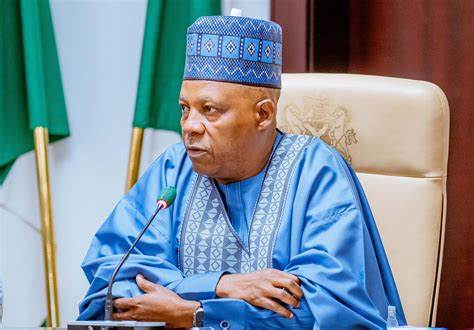The federal government is channeling proceeds recovered from corruption cases directly into the economy to finance critical social investment programs, including student loan and consumer credit schemes, Vice President Kashim Shettima has revealed.
Shettima made the disclosure on Monday in Abuja while representing President Bola Tinubu at the opening of the 7th edition of a capacity-building workshop for judges and justices, jointly organized by the Economic and Financial Crimes Commission and the National Judicial Institute.
“Recovered proceeds of crime by the EFCC are being brought back into the economy to fund critical social investment programmes, including the students’ loan and consumer credit schemes,” Shettima stated, emphasizing the administration’s policy of putting seized assets to productive use rather than leaving them in government coffers.
The Vice President disclosed that the anti-corruption agency has achieved significant results under the current administration, recording over 7,000 convictions and recovering assets exceeding ₦500 billion in value over the past two years. “This enabling environment is evident in the impact that has been made in the last two years. The EFCC, for example, has recorded over 7,000 convictions and recovered assets in excess of ₦500 billion,” he said.
Shettima attributed these accomplishments to President Tinubu’s policy of non-interference in the operations of anti-graft agencies, which he said has strengthened institutional accountability and enhanced public confidence in the fight against corruption. “As an administration, we have prioritised public accountability by strengthening the anti-corruption agencies and giving them the needed independence to execute their statutory mandates,” the Vice President explained.
Addressing judicial welfare, Shettima noted that the administration has improved the remuneration of judges and remains committed to further enhancing their welfare and facilities. “The remuneration of judges has improved, and we are committed to further enhancement of their welfare and facilities,” he said, adding that better conditions for judicial officers are essential to promoting fairness and discouraging corruption within the justice system.
The Vice President emphasized that the government operates within constitutional boundaries regarding separation of powers while supporting the judiciary. He maintained that improved welfare for judicial officers serves as a safeguard against corruption and ensures the integrity of the justice system.
Shettima firmly denied suggestions that the administration shields political allies or public officials from investigation or prosecution. “There is no person or group who can accuse this administration of protecting political actors. We have allowed both the judiciary and the anti-corruption agencies to exercise their powers to restore sanity,” he declared, reaffirming the government’s commitment to the rule of law.
Addressing the judicial officers directly, the Vice President urged them to discharge their duties with unwavering integrity, emphasizing that corruption affects every segment of society without exception. “Corruption is no respecter of persons. Judges are not insulated from its consequences. There are no special roads, hospitals, or communities for judges, we all face the same risks from the effects of corruption,” Shettima said.
He called for collective effort among all arms of government to combat graft, arguing that national development depends fundamentally on accountability across all sectors. The Vice President stressed that judges, like all citizens, bear the consequences of corruption through deteriorating public infrastructure and services.
“A Nigeria free of corruption is possible if we all commit to doing what is right and ensuring that those who deviate from the norm are held accountable,” Shettima concluded, challenging judicial officers to lead by example in the nation’s anti-corruption drive.
The capacity-building workshop brings together judges and justices for training on handling corruption and financial crimes cases, representing a collaborative effort between the judiciary and law enforcement to strengthen the legal framework for prosecuting economic crimes.

















